#intersection has affected them and the people around them
Explore tagged Tumblr posts
Text
There was a Reddit comment around the time Storm was announced as an Avenger (now deleted, unfortunately, so I'm paraphrasing) that highlighted why they thought Storm was the safe choice for mutant Avenger and why Magneto would work better.
Firstly, his recent ideological awakening primes him for stepping outside of his old paradigm. He no longer sees the war as mutant vs human, but as oppressed vs oppressor, no matter their origin or biological makeup. Whether The Avengers is the best place to make a difference in that struggle is another subject entirely, but I think he would challenge the Avengers' MO and priorities, highlighting that for all their victories the world is as unjust as it ever was (especially Captain America.)
Storm was chosen in part because, after the defeat of ORCHIS The Avengers realised that it all happened on their watch, that mutants constantly face oppression - from being killed on the street to outright genocide - and that they need to do more. I think adding a mutant Avenger is a step, but it's been tried before and had no visible impact. Storm is a mutant that everyone already likes so having her on the team makes her a 'good minority' - which is problematic for a whole bunch of reasons and unlikely to affect public opinion in any significant way.
Magneto, however, is the original 'evil mutant' and the most famous. Everyone knows who he is and is terrified of him. Arguably he's one of the reasons people fear mutants on a global level. Initial reactions to Avenger Magneto would be outrage - 'why is the mass-murdering terrorist an Avenger?' Whether seeing him save the world again and again would do anything for the mutant on the street is doubtful, but the 'worst' of them acting as one of Earth's Mightiest Heroes is a powerful statement.
I think he'd offer a different perspective to Ororo as well. She's a hero and a great person in so many ways, but Magneto is far more willing to challenge the status quo and has very specific experiences with oppression and power that only he can provide. His voice in the decision making process would ideally lead to a more intersectional approach (and drama, natch) to heroism, more villains open to the possibility of reform. He'd challenge the Avengers and they'd challenge him in ways that are uncomfortable down to the very fabric of superhero comics.
That's the lens I look at it through - definitely not Avengers Vs X-Men (boring, it's been done, it's OOC) but Magneto PLUS Avengers (and likely X-Men too) and how they'd work together/change each other. Magneto the Boogeyman turned Avenger for all the world to see. Magneto the older and wiser man figuring out how to use his incredible power to change the world. Magneto trying to find his place in the humans' world and challenging himself to follow through on his new perspective.
Secret Wars planned to make Magneto an Avenger

Marvel's first huge event, Secret Wars, was cooked up by Jim Shooter and Mattel to sell toys. Chris Claremont told him that he was reforming Magneto and thus, he was sorted into the hero category when the Beyonder whisked everyone away. Mags was as surprised as anyone.

I wish Cyclops blasted Hawkeye. He was a villain not too long ago, you'd think he'd understand.
Shooter assumed Mags would end up an Avenger due to his power level and because his kids were Avengers. That sadly didn't work out, due to Claremont wanting to keep him, but you can see the seeds of prominence and nobility being planted here. The Avengers and FF were basically looking for someone to punch, and decided to dogpile Mags. They're all delusional, as you can see, and he wipes the floor with them.

The X-Men defend him too, especially Wolverine, even willing to come to blows over it. After alienating one of their most powerful assets, Magneto decides to leave rather than spill mutant blood. When I was reading this as a kid I thought he was the coolest and the non-mutant heroes seemed like oafish clowns. They probably should have chosen a leader before attacking Magneto, dumbasses.
Shooter included the Mags/Wasp romance to give him more links to the Avengers, but we all know that didn't go anywhere. It's not too late though! When he gets his powers back, Magneto the Avenger would be a more powerful statement than a hundred Unity Squads. It's probably not going to happen without a serious shakeup to the way Marvel is run, but I can dream.
48 notes
·
View notes
Text
࣪ ִֶָ☾. My Love Mine All Mine - Shidou Ryusei ࣪ ִֶָ☾.
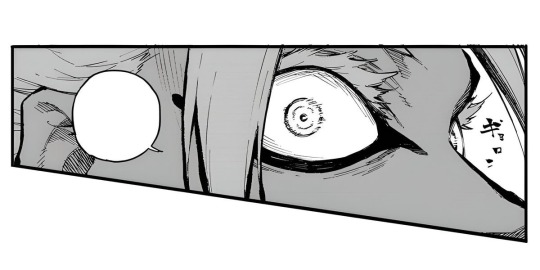
Content: illusion to a bad childhood and trauma but nothing explicit has been discussed, mention of reader wearing glasses synopsis: a "poetic" way of how Shidou realised he was in love with you and the implications of so love
─── ・ 。゚☆: .☽ . :☆゚. ───
Cause my love is mine, all mine… I love mine, mine, mine.
It’s true that in this world, in this life, nothing is free. From what we consume to what we do—everything has a cost. Nothing is free, nothing is certain. And Shidou knows a thing or two about the latter. Growing up in a rough, violent environment where love was a conditional act, he knew from an early age that, yes, in fact; love is conditional. Some people choose to love you because you are pretty, others because you are useful to them, others even because they are selfish enough to open their hearts to the unknown aspects that life has to offer.
Still, it’s one’s capability and choice to love.
And Shidou had not been loved by his parents, not that he could say his parents loved each other to begin with. Their love was a transaction. It was not love when he was screamed at for colouring on the table as a kid and thus punished. It was not love when they forced him, unbeknownst to his young mind, to steal to survive life because of their poor income. It was not love when two selfish souls decided to bring and ���raise” a child in extreme poverty, giving him a setback in life. It was not love. Every slap, every shout, every kick. It was not love.
Cause my love is mine, all mine… I love mine, mine, mine.
Love is not the possession of another. You might have birthed your child, but they do not belong to you. What belongs to you is the love you have for them; that’s all you have. The thing that most do not, or fail to, realize is that love is a deeply human experience. The profound realization that you, as an individual, have the ability to feel a certain way about someone is deeply intersected with the complexity of being human.
Shidou’s childhood was an endless expanse of longing and confusion. Every harsh word, every dismissive gesture carved deep wounds into his young heart, leaving him longing for affection, for understanding. The humane instinct to be free and simultaneously to be freed. In the silence of his room, when night came and he was left to his device at times with shedding tears, he would often wonder what it meant to be loved, to be cherished. But such thoughts were fleeting, quickly swallowed by the harsh reality that surrounded him.
And then, you appeared. Such a contradictory thing. Gentle as the caress of the wind on a summer night and yet loud and firm as thunder during the coldest winters. At first, he didn’t understand you. You were kind, sincere and in a way like him. Honest in your thoughts and words, barely sugar-coating them and yet he couldn't say you were violent. Still, his heart, conditioned to mistrust, shut off at the unfamiliar warmth you brought.
─── ・ 。゚☆: .☽ . :☆゚. ───
One evening, you had followed him on the rooftop of the team's base; not that you would admit that. The untouched camera remained in your hands, as you two sat together on the rooftop, he looked at you. “Why do you stick around?” he asked, his voice rough, almost challenging.
You smiled, but it was not a mocking smile. It was challenging, the good kind. As if to say 'dare try to tell me I am wrong.' "Not that I need an excuse to, but simply because I want to." you shrug as you lay on the rooftop staring the mix of colours in the sky "I think you're worth staying for."
He scoffed, but there was a crack in his bravado. “You must be blind, then.”
“Perhaps. I do wear glasses after all" you say with a hint of a foolish smile.
─── ・ 。゚☆: .☽ . :☆゚. ───
He began to understand love in the simple act of being seen, being heard. That freedom he long waited for, that need of explosion to be seen, had arrived. He does not know exactly how and when it did. He just knows that he started to recognized love in the comfort of your presence. How you stood by him, unwavering, even when his past threatened to pull him back into the abyss. You challenged him, yes, but with a gentleness that was foreign yet profoundly healing. You put him in his place when needed to, but you always did it in such a way that made him want to become a better person by the end of it.
He saw love in your dreams, your passions, and the way you lit up when speaking about them. It mirrored the fire he felt for football, a testament to the unspoken bond between two souls who dared to dream despite the odds.
Cause my love is mine, all mine… I love mine, mine, mine.
And now, Shidou, understands that love is not something to be given or taken, but something to be felt, deeply and unapologetically, within oneself. And no one can take his love away from him. Even during the hardest days, he knows that he has a choice and that choice is to love you.
© GLAMOURSCAT(all rights reserved. do not share, modify, translate and re-upload my work outside of tumblr)
#shidou ryusei#blue lock#blue lock headcanons#bllk x you#bllk x reader#bllk x y/n#bllk x female reader#bllk x gender neutral reader#shidou x reader#bllk shidou#blue lock shidou#shidou ryusei x reader#shidou headcanons#shidou ryuusei x reader#shidou ryusei imagine#shidou ryusei oneshot#shidou ryusei fluff#shidou ryusei smut#bllk imagines#bllk oneshot#bllk headcanons#bllk fluff#bllk smut#bllk angst#kaiser x reader#isagi yoichi x reader#bachira meguru x reader#nagi seishiro x reader
257 notes
·
View notes
Note
Hey Sam! Since it's currently AO3 donation time, I'm wondering what your thoughts are on it? I'm asking because you've written RPF and it's one of many "anti-AO3/anti-AO3 donations" people's favourite things to bring up when they're complaining about AO3 getting so many donations that it continuously obtains an excess of its donation goal whenever donation time rolls around? (Wow, how many times can I say "donation" in an ask?) Sorry if this question bothers you! I don't mean to offend or annoy.
Hey anon! Sorry it took a while to get to this, I don't even know if the drive is still going on, but the question came in while I was traveling and I didn't really have the time for stuff that wasn't travel-related. In any case, let's dig in! (I am not offended, no worries.)
So really there are two issues here and as much as some people who are critical of AO3 want to conflate them, they are different. While some criticism of AO3 may be valid, rhetoric against AO3 tends to misinterpret both in separate ways.
First there's the issue of what AO3 hosts -- RPF, yes, but more broadly, varied content that some people find distasteful or think should be illegal, which is a misunderstanding of the purpose of the archive and more broadly a dangerous attitude towards the concept of freedom of expression.
Second, there's the issue of AO3 generally outpacing its fundraising goals while not allowing monetization, which is a misunderstanding of the legal status of AO3 and to an extent a misunderstanding of philanthropy as a whole.
The longer I watch debates about content go on, the more I come to the conclusion that I was fortunate to have a teacher who really wanted to instill in us an understanding of free speech not as a policy but as an ongoing dialogue. It's not only that freedom of expression "protects you from the government, not the Justin" as the meme goes, but also that freedom of expression is not a static thing. It's an ongoing process of identifying what we find harmful in society and what we want to do about it.
Should the freedom to shout "Fire!" in a crowded theater be restricted? Should the freedom to yell slurs at drag performers? Should the freedom to teach prepubescent kids about gender, sexuality, and/or safe sex? Should the freedom to wear a leather puppy hood at Pride? Who gets to say, and why?
I was nine when my teacher did a unit on freedom of speech and the intersection of "harm prevention" and "censorship", which is (and should be) a discussion, not a set of ironclad rules. This ambiguity has thus been with me for over thirty years, and I'm comfortable with the ambiguity, with the process; I'm not sure a lot of people critical of AO3's content truly are. Perhaps some can't be, especially those affected by hate speech, but RPF is not hate speech. It's just fiction. Or is fiction "just fiction"? This is a question society as a whole is grappling with, although fandom seems to be a little out ahead of society in terms of how explicitly we discuss it.
The idea that prose can incite violence or cause harm is both valid to examine (witness the rise of fascism on the radio in the 20s, on Facebook and Twitter in the past ten years; they're very similar processes) and a very slippery slope. Because again: who decides what harm is, and what causes it, and what we do about it? Our values align us with certain beliefs, but those are only our values, not universal truths. So AO3 is part of the ongoing question of harm and benefit both to society and individuals.
AO3 itself, however, has a fairly defined policy that it is not meant to police content; it is an archive, not a bookstore or a school board. AO3 refines its TOS and policies as necessary, but the goal is always open access and as much freedom of expression as possible, and if that's uncomfortable for some people then that's a discussion we have to have; ignoring it won't make it go away. But it has to be a discussion, it can't be a unilateral change to the archive's TOS or a series of snaps and clapbacks, and I don't see a lot of people ready to move beyond flinging insults. Perhaps because they were taught a much more binary view of freedom of expression than I was.
So, self-evidently, I support AO3 and I don't have a problem with RPF. Whether other people do is something we're going to have to get to grips with, and that's likely to be a process that is still going on when most of us are dust. I'd rather have a century of ambiguity than a wrong answer tomorrow, anyway.
But whether AO3 hosts RPF is truly a separate issue from its donation drives, because it's a criticism some people level at the site which exists whether it's fundraising or not. So people can criticize AO3's open policy and they can give it as a reason not to support the site, but it's just one aspect of the archive and the fundraising as a whole should be examined separately.
I think AO3's fundraisers are deeply misunderstood (sometimes on purpose) because even people who are anticapitalist get a little crazy when money gets involved, and this is, to fandom, a lot of money -- a few hundred thousand, reliably, every fundraiser. To me, a fundraiser that pulls in three hundred grand is almost quaint; my current nonprofit pulls in better than ten million a year and my previous employer had an endowment of several billion dollars. At my old job I didn't even bother researching people who couldn't give us a hundred grand.
On the other hand, AO3 is an extreme and astounding outlier in the nonprofit world, because basically it's the only one of its kind to work the way it does. It is entirely volunteer-run on the operational side (ie: tag wranglers, coders, lawyers, etc) and has no fundraising staff (gift officers, researchers, outreach officers) as far as I'm aware. To pull in three hundred grand from individual one-time donations, without any paid staff and without even a volunteer fundraising officer? That's insane. That doesn't happen. Except at AO3.
What people misunderstand, however, is the basic status of a nonprofit, which is a legal status, not simply a social one. (I'm adding in some corrections here since it gets complicated and the terminology can be important!) The Organization for Transformative Works, the parent of AO3, is a nonprofit, which indicates how it was incorporated as an organization; additionally it is registered federally as tax-exempt, which carries certain perks, like not paying sales tax, and certain duties, like making their financials transparent to a certain extent. (Religious nonprofits are exempt from the transparency requirement.) If you're interested in more about nonprofits and tax-exempt status a reader dropped a great article here.
Nonprofits, unlike for-profit companies, cannot pay a share of their income to stakeholders. Nonprofits don't have financial stakeholders, only donors. They can have employees and pay them a salary -- that's me, for example -- but if a nonprofit pulls in $10M in donations, my salary is paid from that, I don't get a percentage and nobody else does either. That's what it means to be a nonprofit -- the money above operational costs goes back into the organization. The donations we (and AO3) receive must be plowed under and used for outreach, server maintenance, further fundraising, services expansion, et cetera. You can see this in the 990 forms on Guidestar or ProPublica, or in their more accessible breakdowns on Charity Navigator. Nonprofits that do not put the majority of their income towards service provision tend to get audited and lose their nonprofit status. So nobody's getting paid from all that money, and the overage that isn't spent goes into what is basically a savings account in the name of the nonprofit. (I'm vastly simplifying but that's the gist.) Using that money for personal purposes is illegal. It's called "private inurement" and there's a good article here about it. The money belongs to the OTW as a concept, not to anyone in or of the OTW.
So the biggest misunderstanding that I see in people who are mad at AO3 fundraisers is that "they" are getting all this money (who "they" are is never clearly stated but I'm pretty sure people think @astolat has a special wifi router that runs on burning hundred dollar bills) while "we" can't monetize our fanfic. But "they" get nothing -- nobody even earns a salary from AO3 -- and you can easily prove that by looking at the 990 forms they file with the government, which are required to be made public. You can see the most recently available 990, from 2020, here at Guidestar. Page seven will show you the "highest compensated" employees, all of whom are earning zero dollars or nonmonetary perks (that's the three columns on the right).
Either AO3 is entirely volunteer-run or someone's Doing A Real Fraud. The money the OTW spends is documented (that's page 10 and 11 primarily) and while they may pay for, say, the travel and lodging expenses of a lawyer going to DC to defend a freedom-of-expression case, they don't pay the lawyer for their time, or give them a cut of the income.
Despite what you've read, the reason "we" can't monetize our fanfics on AO3 has nothing to do with the site being the product of volunteer handiwork or AO3 having it in their terms of service or it being considered gauche by some to do so; it's because
IT'S ILLEGAL.
I cannot say this loudly enough: It is against the law for a nonprofit to be used by its staff, volunteers, or beneficiaries to earn direct profit from the services provided by the nonprofit.
You can be paid to work at one, but you cannot side-hustle by selling your handmade friendship bracelets for personal gain on the nonprofit's website. If the nonprofit knowingly allows monetization of its services, it can lose nonprofit status, be fined, be hit with back taxes, and a lot of other unpleasant bullshit can go down, including prosecution of those involved for fraud. If you put a ko-fi link on your fanfic, you are breaking the law, and if AO3 allows it, they are too.
Okay, that was a sidebar, but in some ways not, because it gets to the heart of the real complaints about AO3 fundraising, which is that people in fandom are sick or unhoused or in some form of need and other people in fandom are giving to AO3, a fan site that is financially stable, instead of giving to peoples' gofundmes or dropping money in their Ko-Fi or Paypal. And while it is a legitimate grievance that there are people who are in such desperate need while we live in an era of unprecedented abundance, that's not AO3's fault. AO3 doesn't solicit actively, there's no unasked-for mailings or calls from a gift officer. They just put a banner up on their website, and people give. (Again, this is incredibly outlier behavior in the nonprofit world, I'd do a case study on it but the conclusion would just be "shit's real, yo.") You might as well be mad that people give to their local food bank instead of someone's ko-fi.
You cannot lay at AO3's feet the fact that people want to give to AO3 instead of to your fundraiser. That's a choice individuals have made, and while you can engage with them in terms of why they made the philanthropic choices they did, to blame an organization they supported rather than the person who made the choice to give is not only incorrect but futile, and unlikely to win anyone over to supporting you. We know from research that guilt is not a tremendous motivator of philanthropy.
It is also not necessarily a binary choice; just because AO3 gets a hundred grand in $5 donations doesn't mean most of the people giving don't also give $5 elsewhere. I support the OTW on occasion, and I also fundraise for UNICEF and the Chicago Parks Foundation and BAGLY and others, in addition to giving monthly to several nonprofits that I have longterm relationships with -- my alma mater, the animal rescue where I got the Cryptids, my shul. And I give, occasionally and anonymously, to fundraisers that pass through Radio Free Monday, which are mainly individuals in need, because I was once in need and now I pay it forward. These are the choices I have made. Nobody twisted my arm. I respond poorly to someone making the attempt to do so by attacking places I've given.
I think the upshot is, after all of this that I've written, that we cannot begin to come to grips with questions of institutional inequality in philanthropy, or freedom of expression and censorship, until people actually understand what's going on, and too few do. So all I can do is try and explain, and hopefully create a forum for people to learn and grow when it comes to charitable giving.
Archive Of Our Own and the Organization for Transformative Works are products of our community and as that community changes, we will necessarily continue to re-evaluate what aspects of it mean and how AO3/OTW express the community sentiment. I hope that the ongoing discussion of support for AO3 also leads to people learning more about their philanthropic options. But criticizing AO3 for fundraising by attacking it for fulfilling one of its stated purposes is silly, and attempting to guilt people into giving in the ways one thinks they should give rather than how they do give is just going to make one extremely unlikable.
As members of this community, we have to be a part of the push and pull, but it's difficult to do that competently in ignorance. So, I do my best to be knowledgeable and to educate my readers, and I hope others will do the same.
#ao3#otw#nonprofit#fundraisers#ao3 nonprofit#that's my new tag for posts like this#if anyone has any of the earlier posts I've done drop a comment in them so I see the post and can tag it#archive
3K notes
·
View notes
Text
The Problem With the Eddsworld Fandom's Depictions of Red Leader/Future Tord, A Disabled Perspective
Disability is a contentious concept for most of society, with most either treating us with disgust, confusion, refusing to treat us as human, or to see our struggles as what they are. Ableism affects all people in many different ways, but as someone who focuses a lot of my energy in fandom spaces, the pervasiveness of ableism with how media and their fans interpet and react to disabled characters is a very personal situation for me. While many may argue that an ignorance to these topics in fiction has little bearing on real life, the prevalance of these tropes have echoed and led to feelings of othering for many disabled people, and oftentimes support the same notions that lead to the day-to-day ableism in our own personal lives.
In recent years, I have experienced this most often with the prevalance of negative disability tropes perpetrated by fanfiction surrounding the character of Tord, also known under the alias of Red Leader in some fanworks. It is a problem not just common in the Eddsworld fandom. A more recent, and much larger fandom in Mouthwashing also shares a common trend of repeated ableism in fan depictions and interpretarions of disabled characters. Most fan creators are unaware of these tropes and the harm that they cause, but as a disabled person, I am unable to ignore it.
For context on myself, you can call me Fish. Get it? Or"fish"eus? I like to think I'm funny. I am a mentally ill, disabled, and neurodivergent creative who has niche interests in representation in media and the intersection of intersectionality and fandom spaces. I experience chronic pain due to a multitude of conditions, all of which are invisible disabilities. I am NOT an amputee or have a facial difference, like the character I am analyzing. I can only speak based on my own research in my attempts to portray him positively, but I want to mainly focus on the ableist tropes I see and the real life effects they have. That is something I CAN focus on, because I've been dealing with it for years from conditions that came onset later in my life. I will be speaking from that perspective, but will be doing my best to try to educate on what I do know from my research to help authors, artists, and creatives create a better portrayal of him in fanworks.
The most common tropes I see with him are what I will call "The Disabled Villain", "The Innacurate Disability", and "The Ignored Disability". There are a few tropes in each, but for ease of organization (and the sake of your (and my) time), I will be talking about them together in these sections. There are also overlaps in many, but I will define the main issues with them.
The Disabled Villain
James Bond, Wonder Woman, The Witches. You name it. You have most likely seen this trope at work in cinema. A malicious evil-doer is revealed to have a "horrid" face symbolic of the true evil within their soul, while the beautiful, able-bodied hero is meant to stop them. It's a trope as old as time, one that goes back to even Plato. Tropes are tropes, people subvert them, so a few cases down the line may be excusable. But that has not been the case For many years, the most prevalent form of representation for disabled people was in these villains. Imagine if the only representation you had for yourself was narratives surrounding how the way you look or what your disability is and have it only be equated to evil people. It leads to a villainization of disabled people. People react to facial differences with disgust, because they are "shown" that it is "evil", or "ugly", or equal to being a horrible person. As stated by The Nora Project, "According to the book Disabilities: Insights from Across Fields and Around the World, disabled students are two to three times more likely to be bullied in comparison to their nondisabled classmates. The disabled villain trope contributes to this phenomenon in overt and subtle ways. For example, the trope implicitly encourages fear of disability and difference, while validating, and even elevating, those who fight against the evil, Disabled Villain. Bullying based on fear and disdain is almost a natural consequence of the trope when viewed in this light". Another big issue is that disabled characters have not been given space to exist outside of villainy. There are not many complex narratives surrounding them. This leads to our disabilities being downplayed, us being dehumanised, and we are seen more like props in real life, or simply tools to achieve a message in a narrative.
Tord's disability is never explicitly shown in the show. It is something more prevalent in Fanon, specifically in fanworks that focus on the "Future" era of the show's timeline, where the narrative and outside discussions on the show implies a high tech society, potentially dystopian, potentially a consequence of his actions. These ideas have taken a life of their own in the fandom, with many creators fully expressing these ideas. The problem arises when Red Leader falls in line with this trope. In many works, he is the sole disabled character, a figure of pure evil, or given little nuance in the narrative. Artists illustrate his scars as bright red, crimson, or, in TBATF, green. For some reason. In this way, they attempt to highlight the villainy by equating him with common symbols of evil: facial differences and disabilities. Unfortunately, these are not just symbols. These are conditions and scars that real people have, which the fandom tends to ignore in favor of dramatization.
This was a trope I most commonly saw explored in fanfiction when I first joined in 2016/17. The show, unfortunately, subtly and accidentally perpetrated it by having the only character visibly and irreparably "damaged" by the giant robot fight be Tord, despite the fact that Tom, who had a whole missile directed at him and got buried under a house, was fine with at most a leg injury and a cut on his arm. Luckily, we have grown past the need for ableist tropes, and the faults of the show can be left in the past!
... Not.
Disability tropes have simply evolved in how the fandom treats Tord. Even if it is now done with more consciousness and sympathy towards his character, ignorance still prevails. Let's talk about common pitfalls people fall into when writing him.
The Inaccurate Disability
In fanon perception, Red Leader is an amputee with a high tech prosthesis and a facial difference resulting from burn scars. Like many disabled characters, he suffers from a collective fandom lack of research. But never fret! That is what I have subjected myself to for the past four years, so your friendly neighborhood disabled Fish can tell you how to right your fandom wrongs! Just kidding! Take this as a pointer, and do your own research.
As is common with fictional prosthetics, his arm prosthetic is treated as a perfect fix for his amputation. It acts just like, if not better than an actual arm. The issue with this is that is isn't realistic. Yes, I know, I'm criticising Eddsworld fanfiction for not being realistic. STAY WITH ME HERE. Once again, if it was one instance, or a few, that explored prosthetics being incredibly functional in science-fiction, then it could be a cool concept. But when every sci-fi work has it, then that is no longer a concept. That is a misconception. And I have interacted with people who believed that prosthetics were 100% functional! The thing is, like all disability aids, it does not suddenly make us able-bodied. For example, I have ear defenders that I wear when I experience pain within my ears. But that does not mean my hearing will now become normal, and I will no longer experience pain from the sound I'm hearing. What WILL happen is that I will straight up not hear you. Like, literally. Can you repeat that? I had my ear defenders on. Oh, you're saying that my ear defenders aren't prosthetics and are not a fair comparison? Well, that's fair, but take this as an illustration of a disability aid and how they differ from able-bodied experiences. Also, many prosthetic users do many things without their prostheses, and some even prefer NOT to wear them. Blogs that explicitly cover disabled representation, such as @/cripplecharacters, have posts that cover WHY many amputees are not fans of this trope. The problem comes with that it erases disability, and yet also treats us like we are given a space at the table of representation. It's just another way that authors avoid actually doing research.
Other things that people tend to ignore are how burn scars, or any scars, would not only appear on a character, but also affect them. I have seen, aside from skin tones that looked like they were picked out of a crayon box instead of what would appear on a person, teeth exposed, wounds that look as if they are fresh from the explosion YEARS after they occurred, and what I like to call "paper shredder" scars. Because instead of them looking like burn or shrapnel scars, it appears as if his skin was put through a shredder. Once again, another consequence of the show's at most-30 second scene with questionable decisions that made massive ripples in the fandom. With the injuries Tord received, it is most likely that he would have two kinds of injuries: a burn on 18% of his body (minimum, based on rule of 9s), and/or shrapnel scars from debris. While shrapnel scars would manifest as darker scars, the burn scar would likely be a hypertrophic scar, as "70% of patients develop hypertrophic scars following burns" (Finnerty et. al). The scars, when healed, are warm toned on the boundaries of their areas and cool in between. When on a pale skintone, they are not too dissimilar, and would therefore not have such a drastic color difference as seen on skin. They would also not go down to the bone or skin, as that would be a completely different kind of injury, and are also commonly done to make him look "scarier", which then aids the Disabled Villain trope. It also treats these scars and injuries more like a work of fiction, rather than something that many real people have experienced, adding to continuous misinterpretations of real life disabilities and facial differences.
For writers wanting to include consequences of burns, what would be more likely to be affected are his hearing, vision, and nerves on the right side of his face, as burn scars can go as deep as nerve endings. Also, burn scars, especially third degree burns, require treatments, such as burn-specific skincare. Scars, especially burn scars, can affect you and become disabling. For artists, the main thing I don't see artists do is draw him with damaged hair follicles. Burn scars damage the scalp and eyebrows, preventing hair growth. I am sorry, but he would not still have fluffy, luscious hair. Do not kill me. He just wouldn't. And if you are saying that he had it in the show, I can't hear you because my ear defenders are on, but I hope you heard me, as we've gone over that the show is inaccurate and we should do our own research.
Even well intentioned authors and artists ignore many aspects of the disabilities he would likely have!
Which brings us to the last trope...
The Ignored Disability
Many well meaning people intend to give him nuance by trying to avoid the Disabled Villain trope. Accidentally, however, they end up completely ignoring his disabilities instead.
Just like the high-tech prosthetic, the real disabling aspects of having a disability are at best rarely mentioned. I have seen, in some fanworks, that he goes straight from amputation to having a prosthetic. And that is where his disability ends. Because the prosthetic ends up being a fix-all situation. Authors refuse, or forget, to include aspects of amputation, such as the healing process, stump or phantom pain. Artists will cover up his scars with a helmet or a mask, another trope that undermines his disabilities and attempts to brush it under the rug. I understand that there is a discomfort for able-bodied authors in thoroughly exploring how a character feels about their disability. That is something I think we should. Avoid. If you're not familiar with the experience of being that minority, you do not need to add commentary on it. And if you do, and it just falls into more negative tropes, I will send a salmon cannon at you (/j). However, I do not agree with brushing every disabling aspect of his life under the rug.
People can assume it's not a problem, like it isn't something blatantly apparent. But, if you assume that disability and being disabled is not a "big thing", you end up where your medication is denied because your insurance refuses to see your common procedure as not a necessary medical intervention because you're "too young". And that is not fiction. That is what inspired me to write this essay, because the day that I got that news was the same day I sat down and told myself that I needed to share my perspective on the perception of disabled characters by honing in on one of my favorite characters and how the fandom treated him.
Disabled characters deserve to be included in media, disability and all, with care given to how their life would operate as a result and what they would experience with their specific disability. That's why many people recommend sensitivity readers who can give proper insight upon that disability and can advise people to properly portray it.
But if you cannot afford or access that resource, what can you do?
Fish's Non-Cohesive List of Ways I Tried to Write Tord as a Non-Amputee Without a Facial Difference
Do research!! The more you are to try to understand what you are writing about, the less you are to misinterpret or misrepresent it.
Look into resources that focus on portraying disabled characters, especially with those you wish to write about. Read blogs, research tropes that are common in disabled characters, and hell, read medical journals. They can provide great insight (<< nerd who likes reading medical journals)
Include more disabled characters. Make the other boys be disabled! Want to be canon compliant? Create OCs who have disabilities! I have a bunch! It's 2024! Be cringe and be free! The character's disability would go against the traditional narrative form of "usefulness"? I'm an animator who can't wear headphones and a theatre performer who can't physically handle the volume of a band. And yet, we find ways to persist, to exist. We will always find our way to live in the way we want to, in whatever way we can.
Look into disability activism. Learn the difference between the Medical Model and Social Model of disability. Know what an invisible disability is. Listen to us when we say that we don't want to be treated as special or an inspiration for simply living (inspiration porn). The more you are aware of what we struggle in real life, the more aware you will be to not repeat those mistakes in your fiction.
Write what you can. Highlight little talked about aspects of having a burn scar or being an amputee, such as the recovery, or treatment for the chronic pain, or how different he would be in battle due to decreased depth perception. As a disabled author, I have personally touched on the experience of gaining a disability later in life, and how he copes with it. Now, not all of y'all can do that. But that is a personal experience I do have, and it is something I have highlighted in my own work. So, while I couldn't tell you the ins and outs of having a burn scar or a prosthetic arm, I could describe the shock and frustration that comes with suddenly experiencing difficulties, or even being unable to do what you had done before.
I ask that, if you are willing to do better, or to start on the right foot, you take what I have written, reflect on it, and treat disabled characters, and in turn, disabled people, better from here on out.
Fiction is not reality, but the way we deal with it is reflective of who we are and what we believe. The boundary for our own personal being does not suddenly stop within fiction. When we interact and interpret it and create for it, it is integral that we remain conscious that bigotry runs rampant, albeit often as an unseen force, within fandom spaces, and do our best to counteract that.
I have doubts that the new eddisode will treat this topic with the same respect. I hope you can all go forward with what you have read in this WAY LONGER than I expected essay, and do what those grown British men cannot. Even if they erase it, retconn it, or do not treat it with respect, let's all go forward and do better!
As for always, you can discuss more in the tags or my inbox!
I hope you have a wonderful life,
Fish
#eddsworld#personal thoughts#orf.essays#tord#ew tord#eddsworld tord#eddswolrd#you know what? mass taging this one#this is a really important topic to me#eddsworld tom#ew tom#eddsworld fanart#ew fanart#actually im gonna stop#i felt bad#disabilties in fiction#disability tropes#IM SORRY IF I CLOG THOSE TAGS#I JUST THOUGHT IT WAS APPLICABLE#i nearly cried making this#like fully honest#i straight up was on the verge of tears#please be nice y'all.
155 notes
·
View notes
Note
Hi, I saw that you have consulted on a lot of fictional writing, and as someone who has seen plenty of horribly insensitive works around my own disabilities, I feel like it's always best to run it by someone who is actually affected. I hope it's okay to ask you this. My Fabula Ultima team have been working on a world that is likely going to be reoccurring and possibly become written works based on our adventures in the future.
In the place of fantasy "dwarves" we have decided to essentially take the basic idea of "strong bearded race that lives underground" but gave them a different name, and actually made them taller than most humans (since without the horribly ableist origins, that would make far more sense anyway.). Would you consider this revamped fantasy race acceptable, or is it better to scrap the concept altogether?
Hello! A common thread I've noticed within fantasy writers and the race of mystical "dwarves" is that what they really want to hold onto is their culture. I think a great way to do this would indeed be to revamp them as no longer small, bearded men but instead change their height and appearance but keep the aesthetic. Or, if you want your race of small beings, diverge from the burly culture and make them diverse, humanized, intersectional and beautiful. Those would really be the only options to abandon fantasy "dwarves" all together without derailing your writing. But again, the best stories will always be the ones where disability, and little people, are naturally included in worlds like how ours needs to be - through inclusion, accessibility, radical love, community care, and fighting ableism.
#fantasy dwarves#dwarfism in writing#dwarfism in media#faq#dwarfism#dwarfism awareness#disability#asks#little people#fantasy writing
175 notes
·
View notes
Text
i mean, we knew this. but the fact that i’ve seen dozens and dozens of post focusing on queer ppl and telling queer ppl to take care of themselves and queer ppl that it’ll be ok and queer ppl to not kill themselves (which, not saying not to make those posts or that those posts are bad), and not a single, single post* checking in on or showing compassion to Black people, undocumented people and other immigrants, brown people, Muslims, Jews, or other religious minorities — basically, any and all POC in general** — is truly, truly emblematic of what we have known all along: white people fundamentally do not see oppression if it is not happening to them.
*the one or two exceptions were posts i saw before the elections, reminding Black&brown folks to stay safe (bc regardless of outcome, racist hate crimes spike around elections!), and the OPs of those were, predictably, themselves Black or brown.
**QTPOC of course exist. we exist especially at the most dangerous intersections of this violence & horrid effects to our health, mental and physical. but it is frequently clear when ppl make posts like this and consider none of the harm which we are subject to, only that which also affects them.
it does not occur to you to show compassion to us. it does not occur to you to show solidarity with us. it does not occur to you that we are in danger, and have been in far more danger than you, regardless of which color they slap on the white house. it does not occur to you that when you talk about violence against queer people, the vast majority of that violence will fall upon queer and trans POC, especially Black queer people. it does not occur to you that QTPOC exist at all, except when we can be used as a hypothetical argument.
white queer people are white before they are queer. white trans people are white before they are trans. white women are white before they are women. they are disappointed in the status quo only when it stops supporting them. they are aghast and appalled when they are treated like those people. they are shocked and disappointed when suddenly their whiteness no longer insulates them from being treated the way the rest of us are treated. baldwin of course said it first and best:
I think white gay people feel cheated because they were born, in principle, into a society in which they were supposed to be safe. The anomaly of their sexuality puts them in danger, unexpectedly. Their reaction seems to me in direct proportion to the sense of feeling cheated of the advantages which accrue to white people in a white society. There's an element, it has always seemed to me, of bewilderment and complaint.
white queer people, white people in the imperial core, are experiencing a fraction of the dread and violence that everyone else has been subjected to for years. you are afraid, rightfully so. but in your fear and your rage and whatever else, you do not look to those of us who have been fighting this violence for years. you do not offer us compassion and care the way you do with white ppl. you, of course, fall back on your whiteness.
again, none of this is new. we know this. we’ve known this. but it is frustrating nonetheless.
it does not occur to you that we are in danger. that we are dying. that we are being killed. it does not occur to you to to offer us the same hotlines and resources and reassurances and kindness and compassion.
keeping rbs on for now but if people start being weird i’m turning them off. don’t put words in my mouth. don’t say i said something i didn’t. i meant what i said and nothing else.
#us politics#politics#lgbtq#queer#racism#white supremacy#kamala harris#liberal#quasartalks#of course this is also not to mention the fact that it is white ppl — white men AND WHITE WOMEN — who have consistently voted conservative#for every single election in modern history. it is your grandmas and uncles and friends and boyfriends who are killing the rest of us.#you hold more grace for them than you do for any of us.#yt people are the cause of conservatism and fascism and are the least affected by it but y’all are the quickest to fall to despair and#wallowing in it amongst yourselves in your own insular groups of all white friends. you scarce spare a thought to those of us who are#harmed the most.
248 notes
·
View notes
Text
so uhhhhh long post ahead
(cw: emotional manipulation, toxic relationship, survivor's guilt, if there's anything more please tell me)
underverse-adjacent, so it's cross being in the same team as nightmare and killer only. xchara is there too but his presence does nothing to comfort cross.
cross is touch-starved because he was stuck in the empty world for such a long time, and he also craves interaction with another person. and ink used to be that for him until cross realized he could not depend on ink for his goal (restoring xtale) and he felt somewhat betrayed by that notion. this man has trust issues now, not only with other people but also with himself. can he trust himself to be attached to another person? can he trust his decisions, when his past actions only brought him more grief than they're worth?
enter nightmare and killer, who do not care about the morality of his idea to steal and hack the codes of other universes to create his own. in fact, they're enabling him and xchara, only because their goals intersect. but that is more than anything he could hope for. after xtale, after the situation with ink, finally someone is on his side, silently assuring him that what he's done is for the greater good.
killer… does not like cross, mostly because of the whole xchara thing. but someone has to teach the newbie on how things work around here, and it's not going to be nightmare for sure. so he takes cross under his wings, pointing out how things are done. his teaching leaves a lot to be desired though, mostly because he's a cryptic asshole who just won't say directly what he means.
but as cross gets to slowly hang around killer, being mentored by him, he starts to observe how killer carries himself and feels a nagging thought probing at his mind, a thought definitely not from xchara at all. killer is the only source of affection cross can have in this situation - killer is free with his physical affection, always touching cross like patting cross' head, glomping on him, or resting his arm over cross' shoulders. cross likes these gestures from killer, but he cannot show it because he knows what killer will do upon seeing a weakness. his morality and killer's are different - they shouldn't be compatible.
and yet, that nagging thought gets louder and louder in his head. why does he look at killer too much? why does he anticipate any form of praise from killer? why does he hate it when killer contradicts him? one day, xchara will bluntly tell cross that he has an obsession with that guy. it's exhausting watching cross acting like a complete middle schooler with a crush who adamantly denies it. and like, there's no freaking way, right? there's no way a person like cross can have a crush on a sadistic multiversal terrorist. he has better tastes than that!
and like, cross is partially right. he has better morals than that, but it doesn't stop his soul from latching onto the first person who can offer him some physical and emotion comfort, however little there is. but also... cross likes the idea of killer, because he doesn't really know killer. he's in that queer phase of "do i like that person - or do i want to be them". killer is, for all his flaws, a good soldier. he's dutiful by nightmare's side and an excellent fighter. he's decisive, witty, and scarily smart. everything cross aspires to be, his ideal self. he doesn't want to be unsure, he doesn't want to be scared, he doesn't want to be weak. cross' conflicts within himself are multiple, and no doubt nightmare and killer take notice of that.
cross wants to be decisive and self-assured, but he also wants to be told what to do, to follow someone's will. because he's scared of himself - he's still not processed the guilt over his decisions and actions in xtale. he wants control but he also craves guidance, so if he's wrong, at least it's not his fault this time, right?
and killer would play with his head like that. "it's ok, i can show you", "it's ok, it's up to you", "i'll take responsibility for this". if cross listens to killer, then every mistake is on killer's shoulders and not his. "you don't have to feel guilty, because i will be your sacrificial lamb" type of situation. but also, cross will feel he owes killer for this, and he'll stay, over and over and again and again, despite all the horrible things they've done, despite all the times killer guilt-trips him into doing something not in his morality. but it's okay, because it's killer's hands guiding him to do it, and cross will do it if only to make killer happy with him.
and i think sometimes killer will use his wiles to get cross to agree to be his lab subject. cross has such a fascinating soul, and killer won't mind tormenting xchara for a bit. killer will assure cross that this is just something to strengthen cross, to make him a better soldier. a little bit of praises and surefire conviction will get cross relax in his presence. nightmare sure has found a perfect toy for his bloodhound, something that will keep his interests up and boredom away in the down time.
#this might be bad but i won't know#i pour too much angst into cross sorry...#i listened to a lot of ansgty kpop for this... embarrassed 😔#cross sans#killer sans#crosscut#< but the bad kind#bad sans gang#utmv#undertale au
67 notes
·
View notes
Text

𝘋𝘰𝘩𝘸𝘢 𝘉𝘢𝘦𝘬 𝘹 𝘳𝘦𝘢𝘥𝘦r
Blending into the background is an art form I’ve perfected. While some people seem to thrive on drama, I’ve learned that a quiet, unnoticed existence suits me just fine. In a world where everyone craves the spotlight, I find solace in being the invisible observer.
The classroom buzzed with the usual gossip. “That girl has no self-respect,” one voice sneered. “How can she forget—” Another started, but I’d heard enough. I slid my earbuds in, trying to shut out the whispers, but snippets of their conversation still sliced through. “Behavior… something… small.” It was relentless.
I let my head rest on my desk, eyes partially open, watching Su-ae from the corner of my vision. Honestly, I had to agree with the whispers. How could she stay with Minu, who was more like a distant shadow than a caring boyfriend?
Just as I was drifting into my own thoughts, a commotion nearby drew my attention. Eunhyuk, with his usual air of confidence, was gripping another student’s arm. What was going on? I didn’t care enough to investigate further and settled back into my pretense of sleep.
Being a ghost at school has its perks. I get to watch everyone without ever getting involved. It’s a peaceful existence that I’ve grown to appreciate. At home, though, it’s a different story. My family sees me, sometimes more than I’d like.
I have older twin brothers, Jin-ho and Jin-woo. They’re fiercely protective, though sometimes their way of showing it can be a bit rough. They’ll back me up if I’m in trouble but won’t hesitate to tease me if I step out of line. Despite their tough love, I cherish them deeply.
Our family setup is unconventional. My mom is a high-powered lawyer who brings in the bulk of the money, while my dad is the stay-at-home parent. We’re comfortably off but not rolling in riches, which is why I sought out my own job.
That’s how I ended up working at a nearby convenience store. I slip into my uniform, don my glasses—my trusty disguise—and become just another employee. No one here knows me as the quiet girl from school or the youngest child at home; I’m just me.
Early March
The convenience store is my sanctuary. I slipped into my uniform, feeling the familiar comfort of anonymity. The name tag is the only thing that marks me out here.
“Hey, can you stock the shelves?” my manager called out.
“On it,” I said, grabbing a box and heading to the aisles. Stocking shelves is a calming ritual, a contrast to the noise of my thoughts.
As I worked, a familiar face appeared in the store—Eunhyuk. It was odd to see him here; he didn’t seem like the type to frequent convenience stores. Ra-im was with him, browsing the drinks. I didn’t expect to run into either of them.
“Hey,” Eunhyuk said, catching me off guard. “You work here?”
“Yeah,” I replied, trying to keep my cool. “Looking for something?”
He shook his head. “Just grabbing a snack. Didn’t expect to see you here.”
“Small world,” I muttered, turning back to my task. Eunhyuk lingered for a moment, his presence a curious anomaly in my otherwise mundane routine.
“You’re pretty quiet at school,” he remarked.
“Not much to say,” I replied. Why was he even talking to me?
He shrugged. “Fair enough. See you around.”
As he walked away, I couldn’t shake the flicker of curiosity. Eunhyuk is one of those students everyone knows about but doesn’t really interact with unless circumstances align. We’ve shared passing glances and distant nods, but our worlds never really intersected beyond these brief moments. I’m aware of his presence and his reputation, but our connection remains superficial, marked only by our occasional, minimal interactions.
I finished my shift, the encounter long gone from my mind. Home was a familiar chaos. My brothers greeted me with their usual mix of banter and affection.
“Hey, loser,” Jin-ho called out.
“Shut up,” I shot back, grinning despite myself. This was our way of showing we cared.
“Mom’s working late,” Jin-woo said. “Dad’s making dinner.”
“Great,” I replied, heading to the kitchen. My dad’s cooking was always a highlight of the day.
Sitting down for dinner, I felt a rare sense of contentment. Despite the complexities of life, I had a family that cared, a job that provided me with peace, and a quiet existence that was uniquely mine.
#wattpad#anime x reader#x reader#operation true love#baek dohwa x reader#baek dohwa#fanfic#fandom#fanfiction#romance#manhwa#webtoon
86 notes
·
View notes
Text
nooo i wrote a whole RESPONSE to this but then tumblr app crashed and then I had to type the whole thing out AGAIN on my computer and then in that time period the op turned reblogs off. Since they turned reblogs off, I decided to cover up their name, in order to kinda respect that.

my response:
No. It is important to create new words in order to discuss specific phenomena. That’s why words like homophobia, lesbophobia, transphobia, misogyny, transmisogyny, exorsexism, and transandrophobia were invented.
Sure, lesbophobia is covered under “homophobia”, but lesbophobia is an important word for describing how misogyny and homophobia affect women’s experiences of homophobia. Transmisogyny is covered under “transphobia”, but it’s useful to have a term that specifically describes how trans fems experience the intersection of transphobia and misogyny, not just for being trans, but for being specifically trans feminine, and the ways that expectations of womanhood, femininity, manhood, and masculinity factor into their oppression because of their assigned sex at birth, their presentation, and their gender. Exorsexism is covered under “transphobia”, but it’s useful to have a term to describe how transphobia affects specifically people outside of the gender binary. Misogynoir is covered under misogyny, but the term was created to specifically describe how Black women experience the intersections of racism and misogyny. Of course my explanations here are a little reductive, each one of these examples has much more to it than what I listed.
In a similar vein, transandrophobia is useful for understanding how transphobia, homophobia, misogyny, and the meta-epistemologies of those discourses affect trans mascs, not just for being trans, but for being trans masc. Oppression, both systemic and on individual levels of discrimination and prejudice, works differently for people depending on the intersections of their identity (assigned sex at birth, assigned gender at birth, presentation, gender identity, race, culture, ability, etc).
So transandrophobia is useful for discussing specifics like:
The idea of “lost lesbians” and “the trans cult tricking little girls into mutilating their bodies”
The rhetoric of violence around testosterone-based HRT. There is the incorrect idea that people who take T become more violent because they are becoming more masculine.
This association of masculinity with violence, and how that affects trans mascs. For trans people regardless of gender, proximity to masculinity puts people in danger in queer spaces. People are treated worse if they are trans masc, trans fem and don’t pass well enough to the surrounding people, or nonbinary and not sufficiently ‘safely’ androgynous (skinny, hairless, and white, with no prominent secondary sex characteristics).
How trans mascs are treated differently when they come out, or when they start to transition. Many people find that people are colder to them, they experience higher rates of abuse, and if they are trans men they are told to not talk about their experiences because ‘they are men and can’t possibly understand misogyny’. The voices of people who aren’t trans masc often end up being listened to more about trans masc experiences, than the people who have actually lived through those experiences. Like, people are shitty to trans people that are masculine specifically because they are masculine.
Corrective rape
Many people, even in feminist and trans spaces, believe that a man’s gender cannot factor into his experiences of oppression. Eg believe that the fact that they are men is irrelevant to trans men’s experiences, believe that a Black man’s masculinity has nothing to do with how he experiences racial oppression, etc. There are even some vocal people who believe that men cannot be oppressed, and that trans men cannot be oppressed, specifically because being men means they CAN’T experience oppression.
The idea that trans men transition in order to try to escape misogyny
Discrimination in reproductive healthcare
A lot more, it would take ages to list the different kinds of transandrophobia
I also noticed you said “continue to feel its effects if they don’t pass”. But that idea is part of the issue: trans mascs continue to experience oppression for being trans masc when they DO pass. Even if someone is well passing, and stealth, they still directly experience discrimination for being trans masc through things like access barriers to reproductive healthcare, higher rates of abuse, sexual assault, etc.
So transandrophobia (trans andro + phobia, not trans +androphobia as some people against the concept seem to believe) is, like other specific terminologies of oppression, really useful as shorthand for the specific forms of oppression people face not just for being trans, but for being trans masc.
271 notes
·
View notes
Note
I think everyone in the Bllk Fandom has agreed that everyone single guy would be intensely and stupidly obsessed when in love, but who are the biggest simps in your opinion and what is the simpiest thing they would do?? (Simp is used very affectionately btw)
nonnie, if they ain't simping, I don' want 'em ! tags. afab! reader. use of y/n once. suggestive themes in isagi’s. i think i use one bad word lol. kayla if you’re reading this the nanase one’s for YOU! ���
THE BIGGEST SIMPS OF BLUE LOCK (AFFECTIONATE):
—TOKIMITSU AOSHI
this hunk of a nervous wreck genuinely wakes up every day baffled by the fact that he gets to call you his romantic partner. it is beyond any semblance of logic he possesses why you chose to date him of all people — you asked him out, yet he was the one that almost keeled over from nervousness — and it regularly sends him down a neverending loop of self-doubt. your presence, however, soothes the brunt of that spiralling. it doesn’t stop his anxiety entirely, he knows that’s not how it works, but being around you dulls the noise in his head to a thrum he can manage, focusing instead on being in the moment with you. that’s why tokimitsu has the uncanny ability to spot you wherever you are, no matter the circumstances. he could be in the middle of an intense game with thousands watching from the bleachers or waiting near a busy intersection in shibuya to treat you to some umeboshi riceballs for your date, he’s so attuned to you, he’ll glance up and you’re there, cheering him on or giving him an enthusiastic wave with a grin that splits your cheeks apart, the sight making his heart beat erratically in his ribcage, this time not from nerves, but love.
—NANASE NIJIRO
this absolute sweetheart of a man is always talking about you, not that it ever occurred to him that he shouldn’t. he’s the type of boyfriend who finds a million ways to sneak you into the conversation while hanging out with his friends, completely turning the topic from him to you. a simple question of what were you up to this weekend? leads to an inevitable but hearty ramble of oh y/n and i went on a picnic back in kansai, and they made these super yummy wanpaku sandwiches- until basically everyone in his immediate circle can recount your life history. and nanase manages this so naturally, so effortlessly, that his friends don’t even notice they haven’t been told a single piece of information about how he’s doing until they draw a blank about anything regarding him, but can recall your great sandwich making skills and the promotion you recently received with great detail. on the occasion you go pick him up after late-night practice, his teammates frequently congratulate you on things you have zero memory of sharing. at your quirked brows, nanase only chuckles and rubs the back of his neck sheepishly, as if to say i just can’t help myself when it comes to you. he really is your most ardent supporter.
—ISAGI YOICHI
you know those how men wanna be treated when their boys aren’t around memes? isagi’s stance towards your relationship is the furthest thing away from that. he’s open and honest with his affection for you and doesn’t give a rat’s ass about who happens to see him being horrendously smitten with you. he spins around with you at the airport every time you come to greet him home even though he knows it’s super cheesy and the paparazzi may be watching. he rests your chin on your shoulder at formal events, gently swaying your bodies as he hugs you from behind to cure his boredom. he flashes a cheeky grin when you ladle him with sweet pet names, cooing right back at you. his teammates tease and make fun of him mercilessly for it, but isagi’s quick to spit back an aw, not getting any good pussy lately? sorry for your loss, humbling them so nonchalantly you almost forget to smack him for it. it doesn’t deter him in the slightest as he hooks a long finger past the waistband of your pants to pull you closer, ushering you out so you can go home and watch the newest episode of your show together, leaving his gobsmacked teammates behind.
—BONUS: RAICHI JINGO
he has such that’s my wife! energy. raichi would love to show you off and rub it into anyone’s face that he scored the fucking jackpot with you, so everyone can go cry about it while he gets to hog all your attention lol he adores you.
#—ping! new message from (anon)#i almost put reo here but i was like no. no no no he’s obsessive not simpy! there’s a difference 😌✨#—bllk.thoughts!#blue lock x reader#blue lock x you#bllk x reader#bllk x you#tokimitsu aoshi x reader#nanase nijiro x reader#isagi yoichi x reader#raichi jingo x reader
403 notes
·
View notes
Note
i very deeply respect your mashposting and even though im not as enthusiastic about hawkahy as you are i think the content you make for them us delightful and some of the best mashposting on this godforsaken website. that being said, i wanted to know ur takes on the hawkeye & trapper dynamic, and the hawkeye & bj dynamic. Not in a shippy way, just in the World of Hawkahy what role do trapper and bj play in their relationships with hawkeye :3 this because i love that one comic u did where hawkeye is spunchbop and bj is Patrick its one of my fave pieces of mash fanart lol
(๑˘❥ ˘๑) first off, THANK YOU!! i'm soooo crazy about hawkahy and i really enjoy contributing to my fellow shippers, but i'm glad my art can also still appeal to people who are less interested the ship itself.
second, VERY fun question!! i wish i had definitive answers for yall, but you know me... i love to go "well idk it could go either way" ^_^;; really, it depends on what kind of tone and theme i'm looking for. i don't really write heavier stuff (because i have so much fun writing funny fic) so that kind of narrows my options, but there's a lot of potential i'd love to explore— or see someone else explore, if they're so inclined!
TRAP:
generally the trapper reading i typically default to is that he and hawkeye have a pretty casual FWB thing going on. trapper considers hawkeye a very close friend and hooks up with him at an intersection of bicuriosity and deep platonic affection, but hawkeye catches baddddd feelings and ends up genuinely heartbroken to find out their thing was lopsided. in this case, hawkahy would happen only after trapper leaves— mulcahy has a tough time trying to get noticed before that point :( but at the same time, i don't think mulcahy would pounce at the first opportunity, because i don't think an immediate rebound would be good for hawkeye nor mulcahy... but it could happen for dramaaaaa...
another version of the hawkeye-trapper rapport that i love playing with in my fics is trapper being generally very supportive but nonetheless slightly grossed out. i think there's a lotttt of comedy potential with hawkeye thinking it's okay to fuck a priest but NOT a married woman, and meanwhile trapper is pro-infidelity but anti-priestfucking (for whatever reason), and they squabble and tease each other about it the whole time.
it's also funny to think about is trapper trying to figure out whether mulcahy now gets the "one of the bros" back-slapping beer-chugging dude treatment, or if instead he's now slotted into the "go easy on 'em trap" category that protects hawkeye's ladyfriends from hearing trapper's bawdiest jokes and comments when hawkeye brings them along as a plus-one to the swamp.
trapper seems like he's pretty likely to sniff out that hawkeye and mulcahy are seeing each other even if they try their damnedest to keep it secret. i like to think hawkeye trusts trapper enough that he would go ahead and divulge it it up front pretty soon after it's official. trapper could probably even pick up hawkeye's crush beforehand... maybe even before hawkeye knows about it!
i don't see trapper as being too jealous of hawkeye spending a lot of time with mulcahy, even if it means hawkeye is now exclusive and not sleeping with trapper anymore. if anything i think he'd be pretty stoked that he's got one less guy to compete with for the nurses' attention. pretty sweet deal as far as he's concerned.
i do think there'd be some tricky navigating between how hawkeye acts with trapper and the STARK difference with how he acts around mulcahy, which you can see clear as day in the s1 finale, where hawkeye gets soooo soft and careful while talking to mulcahy. i don't think either one is disingenuous; i think hawkeye contains multitudes. hawkeye's not the type to fake sincerity. and to that end, i really don't think hawkahy should hinge on hawkeye totally giving up all the cruder parts of his personality (especially since mulcahy is really no saint either), so it could be pretty interesting to see that manifest in whether/how he's still maintaining a close friendship with trapper now that he's been seeing mulcahy regularly and trying to make a good impression.
BEEJ:
the direction bj goes in depends on whether hawkahy are already an item before he gets there. he does form that almost instantaneous trauma-bond with hawkeye on his first day, but i think if hawkeye admitted "yeah by the way the chaplain is my boyfriend" as soon it seemed safe, bj would be able to take it in stride as another weird little quirk of the mash he has to get used to. he's too hung up on dealing with all the gore to worry about who's banging who.
by contrast, i think he could potentially get pretty upset/jealous if hawkeye and mulcahy paired up a little while later. i can see him feeling really betrayed, like, "what do you normally do when i'm gone?" "wait for you to get back!!"
if bj still doesn't feel like he's really enmeshed himself into the unit— which i think on some level, he never wants to, because he's banking on dropping everything like a hot potato the second he can— then i can totally picture him just feeling completely lost and isolated when hawkeye is suddenly forgoing their boys-nite boozathons in favor of getting some priest pipe. like, at least trapper could always go find his own cuddle buddy to pass the time and had nurses lining up to volunteer; bj has basically nobody and doesn't seem inclined nor equipped to fix that. hawkeye is his liason to the rest of the camp, and bj isn't so great with people without having hawkeye there to help as both teleprompter and safety net.
basically i think bj wants to keep hawkeye within a very specific arm's-length radius— not too close, but not too far either, and hawkeye having so much private time with someone else could really get under his skin.
you could also have bj think the priestfucking is gross/bad on sheer principle like trapper did, even without the jealousy angle, and it'd probably hold a little more water coming from bj than trapper. however, it'd be funny if he's insisting it's definitely not a jealousy thing and he's being fully objective about it, but you can totally tell he's just jealous. x)
i admit i kinda love seeing bj get tormented, because he's got such obvious buttons to press and yet sternly insists that they don't even exist, similar to houlihan and frank. like, you can't just set that up and not expect me to rub my hands together and SLAM those buttons as hard as i can. ergo, bj getting jealous about hawkahy is supremely funny to me. i'm not too proud to admit that!
#shebbz shoutz#ask#mash#hawkahy#obligatory caveat of These Are Just My Takes and i'm not looking for a debate so if you disagree just ignore me :P
34 notes
·
View notes
Text
“Not moving on is worse.”
In the context of season two, I struggle to reconcile the intersection of sincerity and comedy, and the idea of what pains and traumas we are meant to understand at the deeper level of what trauma is with those that serve only the purpose of comedic timing. This isn’t limited to one character, but rather to the season as a whole.
Season one highlighted childhood trauma and the ability to move on from that, becoming the best adult version of oneself possible. We see this evident in Ed, Stede, and Jim specifically as we are allowed to explore their pasts and their traumas — and we can presume that no one on the crew of the Revenge is without trauma (Fang’s dog, anyone?) of some kind that they carry with them. Stede handles his traumas and how to process them through running away and avoiding the issue until he no longer can. Ed does something similar, though he is able to craft a facade to use as a shield and a weapon, even if he never delivers a killing blow himself. Jim dedicates their life to revenge.
We witness all of these characters allow the defining characteristic of love to be allowing themselves to be saved and valued for who they are — not for what they can offer.
When season two opens, we as an audience see Ed at, arguably, his worst (I say arguably because we didn’t see Blackbeard in his prime, so… do with that what you will, I suppose). We see how this affects beloved and treasured characters, as well as new characters that we have yet to fall in love with. We see Fang fall apart not once but twice within the first two episodes alone. In episode two, we see Ed — a much beloved and adored character who we know intimately — lash out when confronted for his behavior. He lashes out at his crew and physically mutilates his closest confidant for daring to question him. “But that’s piracy!” And you’re right! But don’t we watch the first episode of season one highlight how much Stede Bonnet wants to change piracy? Isn’t this show supposed to be about found family, and getting better, and finding healing? In which case, we’re watching Ed behave abusively in the wake of his mental struggles as he once again attempts to hide behind the same facade that has protected him in the past. Ed suffers this breakdown in response to not one but two perceived rejections from the two people he would claim to be the most important in his life, and in a classic mental illness fashion, he barricades himself off and settles into the persona that is everything he doesn’t want to be.
His crew fears him. They’ve been kidnapped and essentially held hostage under the man they believe to have murdered their crew — their friends — and are watching him continue to devolve. Enter Izzy Hands and Jim Jimenez. Izzy is well aware of his hand in Ed’s state. “Well, he instigated it!” He did. He wanted back a version of Blackbeard who he saw as safe territory: a necessary evil for the continued survival and safety of the crew, ship, and Ed and Izzy themselves. And then he watched Edward “Only Ever Killed One Person Personally” Teach fulfill the legend he’s always been known as, and watched him become someone who couldn’t care less about life or death or anything in between. Ed surpassed and buried the version of Blackbeard that Izzy wanted to return, and he was force-fed the consequences of this with an unavoidable cruelty. “Well, he deserved what he got! Violence was always on the table, because it’s piracy!” But once again, we’re operating under the assumption that the big themes of this show are healing from trauma and being worthy of being loved even if we’ve done bad things.
While we’re on that topic, though, let’s explore that. Ed’s childhood trauma comes from his abusive father. He carries the weight of that abuse with him well into adulthood, as well as the weight of what he had to do to survive it. What he had to do to save his mother. This season sees him abusing those around him. Despite this, despite his erratic behavior and the mistreatment of his crew, he is still loved (by crew and fandom both, if I may add). He is still loved by Stede, despite the trail of blood he leaves in his wake. Stede is still longing to find him, despite knowing what he’s done and what he’s now capable of, and this continues to reiterate that idea of you deserve to be loved even when you’ve done wrong.
And then, Stede finds him.
We as an audience witness Ed make the choice to stay alive. We watch the thought process, we see that he chooses to fight for that love that comes alongside being saved. Being wanted. Being seen for who you are and loved because of it. And up to here, I’m on board. I’m excited to see what’s next and how Ed will reconcile for what he’s done and the harm he’s caused at the hands of his mental illness — because the truth is, we harm people when we aren’t adequately being responsible for our mental illness. This is a real-world thing. We lash out when we’re hurt, or when we’re rejected, or when we’re struggling. When we’re suffering, we often can’t see past ourselves to see whether or not we’re also causing others to suffer. This does not make us bad people — and it didn’t make Ed one. And then the “apology” came and went. The only member of the crew Ed really sits and ever has a drawn out conversation with about anything is Fang, and even this is somewhat shallow. Fang absolves him and moves on. We don’t get to see whether or not Ed ponders this conversation long-term or whether or not he battles with himself over how to move on.
We’re left with a traumatized crew who semi-accepted a half-hearted apology and a beloved character who hasn’t actually been held accountable at all. “But he apologized and wore the bell and fixed that door latch!” Yes, and? He physically mutilated his first mate, instructed him to be killed, traumatized an entire crew — and this all takes a backseat to his relationship with Stede. And what a stunning scene between the two of them in the moonlight, where Ed finds it in him to ask to take things slow. Where he recognizes his needs and vocalizes them. I left this episode feeling so hopeful, because half-baked apology aside, Ed is actively learning to vocalize his thoughts and ask for what he needs when he recognizes in himself that something is going to be harmful to him. We had a kiss, we had Ed asking for help when he needed it, we had a proposal, we had “not moving on is worse,” and even knowing only three episodes remained, I left feeling like we had been so perfectly set up to see how things were only going to keep improving.
In the first episodes of the season, we see murderous raids and mutilated first mates and two suicide attempts (though I suppose one was more of a mass murder-suicide attempt?) and these are all thrown together. In episode six, Stede deescalates a raid from a bloodbath of his own crew and sends another crew on their way with the lessons and values that he has been pursuing since the first episode of the first season. He then, in a parallel to the French ship of season one, causes a man’s death. This is highlighted as a turning point, something that can’t be ever moved on from. (“There’s no coming back from that.”) But what about the other traumatic events of the season that are treated as jokes? Izzy’s drinking, day in and day out, bottle after bottle after bottle — coping with the reality of his life and the way it’s been altered beyond recognition. The mop he used as a makeshift leg snapping, forcing him to pull himself away from the crew with his own hands. Lucius’s mention of being sexually assaulted and Stede’s look of disgust, the way he literally runs away from the conversation. Lucius never gets to air out his traumas, not really, not with someone who listens and tells him he’s safe and allows him to talk things through. Even Pete gets ill instead of being able to offer support.
I struggle to reconcile what is and isn’t comedy in this season, or what violence is meant to be taken for what it is. The Ed and Izzy breakdowns in episodes one and two sat far too close to my chest for me to look past them into comedy — and the suicidality of both men was glossed over and moved on from so quickly, never explored. Did Izzy’s “I wanna go” in the final episode mean he never moved on? That some part of him was still lying in that room with a gun to his head? You don’t become non-suicidal in a matter of days — is there still something lingering in the back of Ed’s mind? There was never a conversation about it, and there was never anything between the two of them that could allow me comfort in knowing that they had reached some sort of understanding. This season pulled domestic abuse, alcohol abuse, and suicidal tendencies straight from my own traumas and never held anyone accountable for any of them. There was no healing. There was no real talking it through. “Well, it’s not a rom-com, so—” Except it continues to be presented as one. Shortcomings of storylines of characters that seem to have been cast aside or mischaracterized this season aside, I cannot for the life of me reconcile how a show about kindness and moving on and being loved amidst all of your flaws could have a season so wrought with traumas and yet never discuss them. Never explore them in a way that allows me to move on. I love this show and there were so many good things about this season; I love these characters, and yet I feel so disconnected from it for the first time in over a year. Not moving on is worse, sure, but moving on without accountability leaves wounds unable to heal. How do you move on from that?
177 notes
·
View notes
Text
2024 Book Review #47 – City of Last Chances by Adrian Tchaikovsky
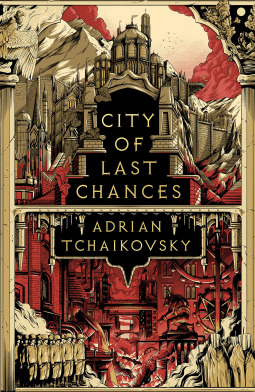
This book was recommended to me by a few different people, and in any case I am generally a pretty big Tchaikovsky fan. So of course I’m only getting around to reading it now, however many months later. Having put it off so long for no good reason at all, I can say that the book is in fact very good. Not Tchaikovsky’s best work (that’s still Children of Time in a walk), but a good read and one that left me curious (if not exactly excited) about checking out the sequel.
The story takes place in Illmar, the eponymous City of Last Chances – scarred and oppressed, tyrannized by cursed dukes and conquering imperialists, built upon a dangerous and unreliable route to other worlds and forever attracting the sort of people with no better options available to them. While the book has any number of characters, it’s really the city itself that is the star of the story – a story of how the theft of an imperial magistrate’s ward before he makes an experimental voyage through the gateway in the woods leads to a whole series of byzantine intrigues and bloody misadventures, culminating in an abortive revolution against the Pallseen who occupy and rule them. Which in one sense is an absolutely massive spoiler and in another just feels like stating an inevitability that was obvious from the first chapter.
The book was apparently quite heavily marketed as harking back to the whole New Weird trend of a decade or two ago – marketing that is lived up to wholly and entirely. The whole book absolutely drips with Mieville and Vandermeer. The oblique worldbuilding, the mundane day-to-day life built around the opportunities and inconveniences of some intrusion of the sublime, the awkward intersection of ancient magic and industrial bureaucracy, and so on, and so forth. The Reproach in particular feels very Area X (or very Roadside Picnic, as you prefer), but in general the city feels like absolutely nothing so much as Bas-Lag with the weirdness dial turned down from an 11 to a 5 or 6.
It’s a real triumph of the book, I think, that the world genuinely feels vast and strange even beyond the points where it matters to the story - that all the little asides and the ways something affects a certain character feel like just small parts of something far grander and more uncanny than anyone can hope to understand. Maybe I’m just painfully tired of rpg-system worldbuilding, but it’s an effect I dearly love.
Much like Bas-Lag, Ilmar is very clearly a magical fantasy city going through a magical fantasy 19th century industrial revolution (instead of steam engines its demonic slave labor contracted and imported from the Kings Below). The meat of the book is playing into the whole tradition of the idealistic, virtuous but tragic liberal revolution – 1848 in Berlin or Vienna, the June Days and Commune in Paris, Warsaw a dozen different times, Les Mis. You know the type. Students singing patriotic old songs, workers rising up against class oppression, ‘revolutionaries’ who are mostly cowardly nobles pining after lost privileges and criminal syndicate putting on airs being caught flat-footed by events. You can probably tell the basic story in your sleep. But for such a venerable genre, this book's honestly probably the best rendition of ‘fantasy 1848’ I can recall. Something which won it my instant affection.
The other thing the book just overwhelming shares with the Mieville’s Bas-Lag books is a very keen sense of the necessity of revolution combined with an extreme cynicism towards anyone who might actually carry it out. The university students are sincere believers, and also naive sheep the narrative views with condescension (at best). The professional revolutionaries are all power-grabbing hypocrites who have wrapped themselves in the flag. The workers syndicates have a real sense of solidarity among themselves, and also none at all to the demon slaves that are used and broken powering the mills and factories. And so on. The overall thrust of the book is a tragedy not in the sense of railing against the inevitable, but in the sense that triumph and revolution were absolutely possible – indeed plausible – but for the flaws and frailities of the revolutionaries who might have accomplished it.
Not to say that it's misanthropic – the book is very humane towards the vast majority of its POVs. Of which there are enough for ‘vast majority’ to be a meaningful term. It was something like 130 pages in before any character got a second chapter through their eyes, a feat I had previously only seen in Malazan – and that’s not including the chorus chapters which just give a half-doze vignettes from across the city. But yes, most characters (even the ones who are really just viscerally repulsive) are shown through their own eyes as someone who is at least understandable, if not particularly sympathetic. The sheer size of the cast in a 500 page book mean that no one character or set gets that many chapters from their perspective (you could easily have written as long a book about roughly the same events with half or less of the cast), but some of the dynamics that are very lightly touched on are just incredibly compelling. Its enough to make you wish this was a series that would ever get any fanfiction written about it, really.
Given the way the book is so deeply concerned with oppression and violence on the basis of culture, class, and nation – imperial occupiers, native population, refugees and immigrants used and scapegoated by both – it is kind of fascinating that this is a world where misogyny and (possibly? Not very explored, the only example of a queer relationship we see is hardly going to be concerned by normative society) homophobia just flatly don’t exist. Which would be less interesting if it was unusual, really – the same could be said about very nearly every recent sci fi or fantasy book on the same lines I can recall. Interesting because it is very much not the case in Melville’s stuff – the cultural impact of Ancillary Justice continues to echo down the years, I guess. So yes the imperial police inspector will extort sex out of a brothel owner in exchange for not stringing up the entire workforce for peripheral involvement with the resistance, but also this is entirely gender-neutral. Something very modern about how oppression is imagined relative to the ‘90s or ‘00s (or just a different genre of self-consciously feminist novel a few book shelves to the left).
But yeah, great book, I am compelled. No idea where the sequel would be going, but will probably hunt it down sooner rather than later.
42 notes
·
View notes
Text
I'd like to take a moment to talk about the season 8 Alfea refurb.
Season 8 sees not only the largest shift in art direction of any season of Winx, WoW included, it also sees a complete rebuild of Alfea, and while I do like some parts of the refurbishment, it does a couple of things that make me go “hmmmm.”
The biggest one of these is the destruction of the courtyard/quad's baby elephant paths*.
(*Misuse of the term "Baby Elephant paths" here, a Baby Elephant Path, also called a Desire path, is a path that is created by people continuously using what is often the shortest or easiest route regardless of whether or not it is a paved path, often causing dead grass and dirt tracks in lawns as they move across areas or through gardens. The term here is used in place of anything better, because the original Alfea courtyard layout contains paths that would likely be a closer match to the true Baby Elephant Paths if the courtyard wasn't pre-paved.)

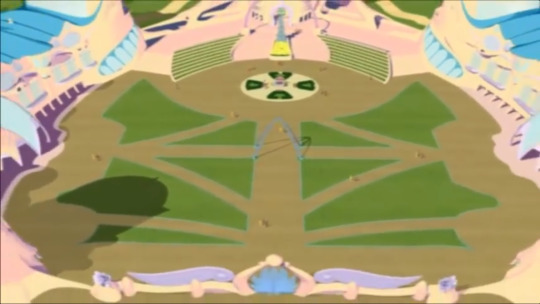
In season 8 the 10 panels of grass are swapped out for 16 gardens arranged into a... well I suppose sea shell would be a good word. A dragonfly-wing clam-shell.
And it looks fantastic, but it also completely ruins the path finding of the courtyard.
Chucking it under a cut because it does go on a bit.
While each of the 8 dragonfly wings of this shell allow students to travel from the staircase of the central building outwards towards the two mirrored side buildings, and each wing is segmented into two, in order to allow a squiggly path to cross from one grass display next to the central stairs, around in a horse-shoe-like loop to the other grass display beside the central stairs.

Originally, the staircases that bridge the courtyard's level and the elevated platform in front of the central building are also affected by this renovation. Before season 8, there were 4 staircases.
The original central staircases were separated by a slim garden that rose along the incline like a pretty dividing rail, then two more staircases rose along the sides of the mirrored buildings. These outer staircases were separated by wide steps of grass. Good for sitting, laying, or feral student 'parkour.'

The grass panels that made up the courtyard were (and as of season 8, still are somewhat) surrounded on all four sides by wide paths that allow students to skirt along any of the building, fountain area or outer fence line without stepping on the grass.
Further, the original grass panels, though they did get upgrades like lights and small hedges as the series went on, were easy to walk over or lounge on them between classes, the season 8 grass sections have larger hedges, and a student would either have to put a bit of effort into jumping over them, or access the much smaller grass area through the open side along the squiggly path.
The path finding of the original court yard layout was also much more accommodating.

The original layout had two direct paths intersecting it, one from the front gate to the central building (actually to the wide fountain area where it would be easy to park a bus for students to (dis)embark for school trips,) and one from the central door of one mirrored building to the other across from it.
Further, it has three baby elephant type paths, that accommodate for paths that are likely to see a lot of foot traffic throughout the day.
One from the gate area to the central doors of the mirror building, one from the fountain area to the central doors of the mirrored building, and one from the front of the mirrored buildings (or the front of the covered walkways, not the tower door) to the front gate.
While the season 8 layout allows direct travel from the front gate to the fountain/central building, it has none of the other direct access pathways. The season 8 gardens would enforce circular travel around certain wedges or for the students to jump the hedges as they move from one building to another.
The season 8 gardens assume travel directions to and from the fountain.
So yes, it's pretty, but it's not really functional for a school. It's more the type of fancy garden you'd find at an estate or museum grounds. Something to wow visitors, not something for students to enjoy or use the space.
The court yard's main pathway is also a lot slimmer than the earlier seasons, which makes sense, since season 8 Alfea is overall, much smaller and shorter. But it Boggles me when I stop and really try to compare what that means, visually:
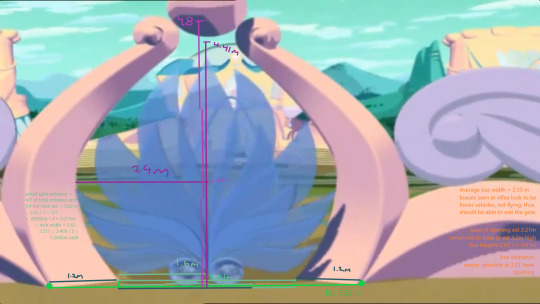
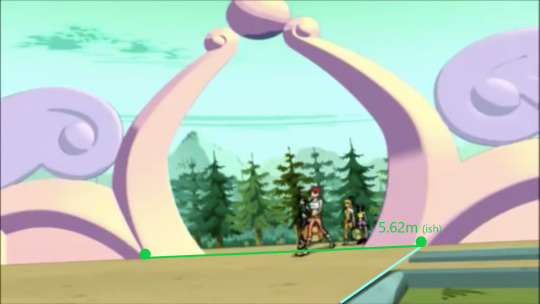

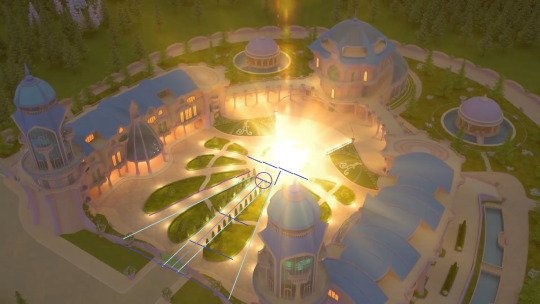

And that's just the courtyards in overlap. Season 8 Alfea's buildings could probably fit (if snuggly) within the season 1-7 courtyard without removing the season 8 courtyard. (The external garden areas (now with pools and gazebos) might not make it though...)
Speaking of the building:
In early seasons, the covered walkways possessed an arched ceiling hidden by facing, but below that it was possible to see a full length door. Basic slap-dash calculations suggest that Alfea's mirrored buildings sit at a height of up to 20 meters, not including the attic peaks on both sides (above the glass domes above the central doors, aka: stella's closet space.) because the space between the ground and the bottom of the balconies of the long windows that line the buildings is at least three-to-four times the height of the doors.
I previously put forward a theory that there were mezzanine levels, and split levels, within the building, but that it was fundamentally 5 floors (not including Stella's attic which would make it 6). And this didn't bother me all that much, we've seen that at least some classrooms have mezzanine walkways, and pretty high ceilings, we often see the high vaulted ceilings in the halls.

And it makes sense, because this is a school for fairies, and fairies fly. So of course they'd have enough room in a classroom to practice something while flying, of course you could fly down some of the halls without buzzing people on the ground, that makes sense with the context.
But season 8 Alfea? Is much, much shorter.
From the ground to the bottom of the balconies? Is two doors if that.
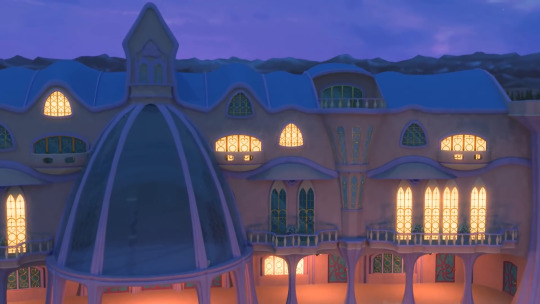
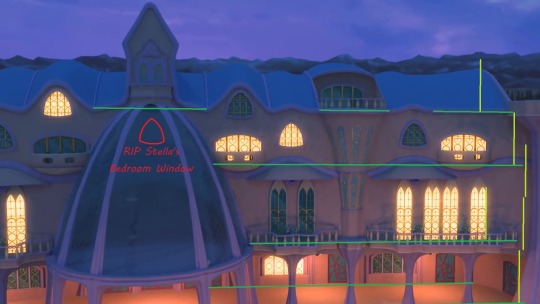


Meaning the height of the externally visible ground and second floor is not between six and nine meters, but four meters tops. Possibly closer to three.
More than that, where once there were three doors and two and a half banks of windows between the central doors and the tower doors that marked the ends of the walkway, there is now only two doors and two large windows on one side of the central doors, and one door and two large windows on the other.


Estimated length of season 8's walkway is around 16m from one end to the edge of the central door's area. My prior season 1 estimate has that same stretch at up to 30 meters.
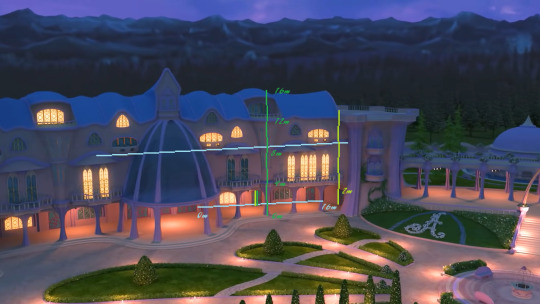
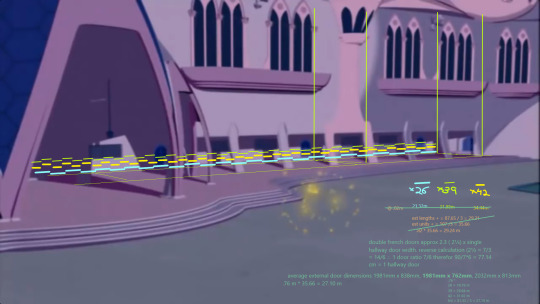
The upper section and floors of the back towers are missing entirely to make the tower shorter than the main blue roof of the mirrored buildings. In addition the lower floors where the combat exam areas and magical reality chamber outer chambers are suspected to be, are slimmed down to the point I doubt there are any substantial rooms in them.
The front towers are missing external doors because they are now too narrow around.




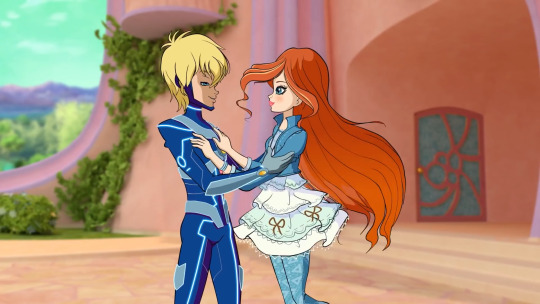
I honestly don't know that the mirroed buildings are even wide enough, courtyard side to fence side, to hold more than one row of classrooms per floor, let alone two.
In early seasons, counts of students seen in wide shots, like the dining hall, counts of individual classes, and parties, often leave us around 50-70 students. I don't think I'm the only one who assumes that that's not an accurate count, that there's probably some day students (even though it's a boarding school) or seniors out on work experience, or just not everyone is in that one shot, and we're working with a medium that is given to copy-paste crowds, but generally, it feels like Alfea can fit an average student body of 70 and have wiggle room for more.
Season 8 Alfea makes me go "I don't think this place will fit an average body of 60 students."
Season 1 of Winx Club saw Alfea host not just the students but also the teachers of Alfea, Cloud Tower and Red Fountain at the same time during the Trix's siege. Lets assume the schools have a flatline average of students, that's still 150 at a minimum. 210 max if we assume there are no other students who come and go and throw off the numbers.
Plus the staff, which is at least 5 known teachers between Cloud Tower and Red Fountain, and at least 8 for Alfea. So Add in 13 Teachers.
Season 8 Alfea does not have the space, it cannot host that many people.
Maybe it could, maybe it's a more realistic building, maybe the internal structures make sense, but I've spent so long trying to wrap my brain around season 1-7 Alfea that I just... I can't with season 8 Alfea.
The Things about the Season 8 Alfea refurb I do like:
The glass dome on the mirrored buildings has a semi visible interior, which could be used as a green-house/sun room, where the earlier seasons it was just sort of there and high vaulted on the inside up to like, half way the large balcony windows. Like there doesn't look like there's anything in there from the outside, but it could be a good inside green space. or for hanging out washing on rainy days.
The big light under it is also pretty nice, kind of sunny/sunflower aesthetic.
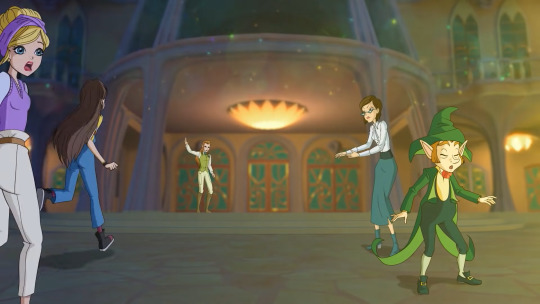
I also love the detailing in the windows and doors, it's super cute and feels like a low-key fairy aesthetic next to basically flat green doors (I've been assuming the early season doors are at least partly green coloured glass paneling in the dorms)
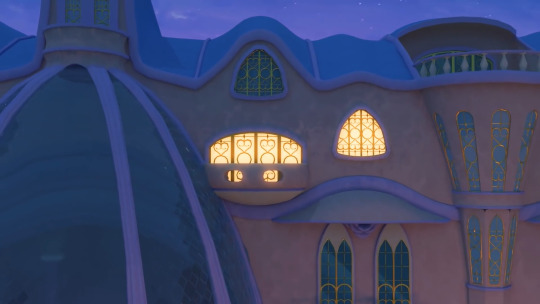
The upside-down flower lights lining the external walkways are life giving, tbh. I need them.
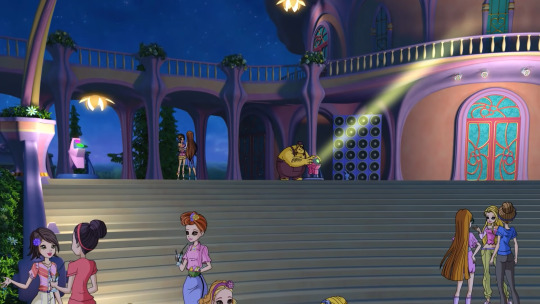
#winx#winx club#alfea#winx season 8#season 8 refurb#non referential rambles#don't fret I don't hate everything#winx alfea#I have had this sitting in my drafts since march 10th
54 notes
·
View notes
Text
"The New Voyages" review
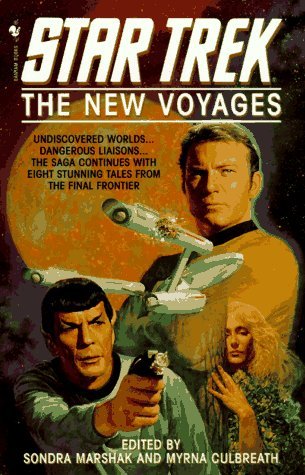
This one is actually a collection of short stories by fan authors, which makes the stories seem more like episodes of the series. It has also the distinct honor of being introduced by Roddenberry and most members of the cast. The stories are generally well-written and in character.
Some spoilers ahead:
Ni Var (by Claire Gabriel; intro by Nimoy) takes the plot of "The Enemy Within", but applied to Spock and the division between his Vulcan rational part, and his human emotional part. Besides the fact that I'm not sure such division works at that biological level, the two Spocks aren't all that different really. And it's not a very novel concept, specially right after a similar plot in previous book "Spock must die". But bonus points for Kirk giving the middle finger to his own reflection.
Intersection Point (by Juanita Coulson; intro by Doohan) is one of the best stories. The Enterprise is seriously crippled while navigating through an anomaly cloud, which is quickly contracting and threatens to crush the entire ship. Anyone who enters the cloud to retrieve a crucial component of the ship, is mentally destroyed by its eldritch qualities. Great tension and difficult choices.
The Enchanted Pool (by Marcia Ericson; intro by Nichols) is an attempt to write a fairy tale with Spock thrown in the middle for good measure. A bit of purple prose, and doesn't quite work. The resolution of the mistery is ingenous, even when convoluted.
Visit to a Weird Planet Revisited (by Ruth Berman; intro by Barrett) is actually the other half of a fanfic (Visit to a Weird Planet, not published here) where Kirk, Spock and Bones end up in the real world, right in the studio where they're filming Star Trek. Here instead, we follow the actors, who appear in the Enterprise and have to improvise to avert a danger. The other story was more fun, since Kirk and co. are more clumsy and hilarious in our world (being even "attacked" by fans), while the actors are just slightly less competent than their counterparts.
The Face on the Barroom Floor (by Eleanor Arnason and Ruth Berman; intro by Takei) is a really fun story. Kirk gets into a fight in a bar while in shore leave, is detained, teams up with a ratty thief, and crashes a party, while his crew search for him frantically. In the line of TOS best comedy-adventure episodes.
The Hunting (by Doris Beetem; intro by the editors) is a bit "meh". Spock goes into a Vulcan ritual which requires to mind-meld with a wild beast, and McCoy accompanies him. When Spock goes wild in the process, the good doctor has to hunt him and give him back his sanity. There could have been a more homoerotic fight between them, as in "Amok Time".
The Winged Dreamers (by Jennifer Guttridge; intro by Kelley) is another high point. The Enterprise crew falls under the influence of some creatures that make their fantasies seem real. So real that people can actually die if imagining the wrong thing. Spock is less affected, but slowly begins to hallucinate too, and the triumvirate fall into paranoia as neither they (nor the reader) can tell what's real and what's not anymore.
Mind-Sifter (by Shirley Maiewski; intro by Shatner) drags a bit at the beginning, when Kirk wakes up in a sanatory, his mind almost destroyed. It gets more interesting once Spock and McCoy start a quest to search for him. Great interactions between these two, reminiscent of "The Tholian Web".
After the eight stories there's still a little poem about Spock and Leila.
Spirk Meter: 10/10*. Not all stories are equally slashy, but the parts which do, are slashy in spades.
Ni Var has Kirk worrying about Spock all the time, and "human Spock" wondering if what he feels for the Captain is friendship... or love (something which happens too in one of Roddenberry's story concepts for a movie, around this time).
Intersection Point has a clear parallel between the anguish of a female crewmember, after a man (obviously her boyfriend) loses his mind in the anomaly, and Kirk agonizing once Spock has to enter the same anomaly.
The Enchanted Pool, where Spock refuses to kiss a beautiful female time and time again. Even when the woman assures him it's the only way to break a spell and escape. Even when Spock is doing far more dangerous things ALL THE TIME to solve problems. Of course, he considers the kiss a total waste of time once it doesn't work.
The Face on the Barroom Floor: Kirk is invited to a bar by McCoy and Sulu, who have found three women to pass the time, one for each. What does Kirk do? He gets out the bar two seconds later, puts on a samurai costume, and goes instead to a bar full of muscular, rowdy men, to get thrashed by them. Of course.
The Winged Dreamers has Spock wishing to stay on a planet with Kirk, just the two of them, for ever and ever. McCoy totally gets what's going on.
And I thought that Mind-Sifter would be about the love between a (quite unproffesional) nurse, and her mentally unstable patient, Kirk. But oh man, where do I even begin!? For starters, we have Kirk using his mind link with Spock to cry for help, across the galaxy and several centuries. And later he's concerned about how much can Spock read into his mind. Then we have McCoy informing the nurse that no, Kirk can't stay with her, because his love is his career and his... (trails off, having said too much). Gallant Spock carries an unconscious Kirk in his arms, and tells the nurse that, no matter how much she loves him, Kirk DOES NOT love her back (bitch!). If that wasn't enough, there's a lenghty conversation at the end, where Kirk almost melts in love and appreciation for Spock, and the Vulcan blushes at his own emotional display.
*A 10 in this scale is the most obvious spirk moments in TOS. Think of the back massage, "You make me believe in miracles", or "Amok Time" for example.
158 notes
·
View notes
Note
“White disabled people want more because they think it’s unfair they’re not having what their white peers have”
I have not met a single black disabled activist that’s said this is the problem white disabled people have. Because it isn’t.
The major problem with white disabled people and the whiteness as a privilege is our medical systems.
- Dx’s are based around white cishet abled men. The further removed you get from this the more issues you face in the medical field.
- White people are more likely to be believed on their pain and issues, but more likely cis white men are.
- They’re more likely to be given accommodations and believed on their accommodations than their black counterparts
- Black people are more likely to be written off as lazy or unfit, because of their skin.
- Black people are more likely to be labeled as drug seeking and denied pain relief medications
- Black people are more likely to be ignored about conditions affecting them because “that cannot happen to black people” (skin cancer, the bullseye rash from that one tick, I’m fairly certain there’s more)
Like. Yes. White privilege exists for white disabled people. But not in the way of “I want to be equal to non-disabled people”.
Hell that argument is like, pushing their disability accommodations over other ones.
For example, someone forcing a black disabled person in their wheelchair not to talk about their wheelchair because they have anxiety or depression and it makes them feel worse.
Which is less an intersection of entitlement but rather white tears and how white people prefer centralized attention on issues.
Or when white people dismiss black specific issues and claim it’s because they don’t want a divided community.
So it’s no wonder they’re pulling the “trans men get preferential medical treatment because they’re men” because I don’t even think they know the complexities of agab and medical navigation, considering they don’t know race and medical navigation.
It feels very much so like someone who has read basic theorum someone posted, never engaged with the specifics of the situation with people who are advocates and is now parroting, but doing it poorly.
Because like, they’re not wrong, white privilege with disability is a thing.
But that’s not really it. At all.
Sorry for the long ramble, I know it’s not a focus of your blog and the issues you talk about. Feel free to delete this if you want.
yeah this is what I've heard too I think? correct me if I'm wrong but I think this is pretty solid
30 notes
·
View notes